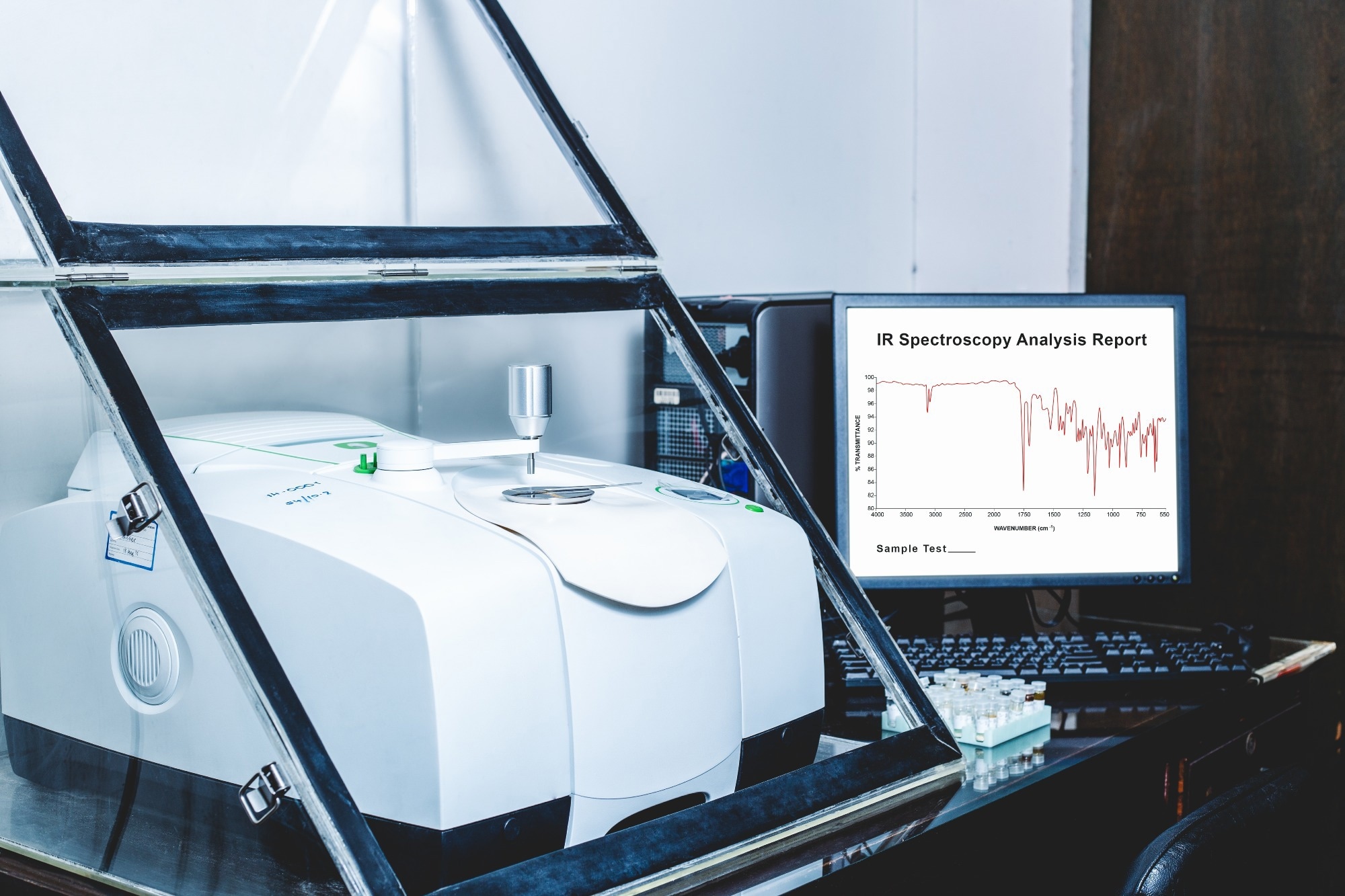In a recent review article published Advances in Sample Preparation, researchers explored the diverse applications of Fourier Transform Infrared (FTIR) spectroscopy in sample preparation techniques, a critical aspect of analytical chemistry. The goal was to examine how this powerful tool can enhance the efficiency and accuracy of sample preparation across various scientific fields.

Image Credit: S. Singha/Shutterstock.com
Background
FTIR spectroscopy is a well-established analytical technique that provides detailed insights into a sample's molecular structure. By measuring the absorption of infrared radiation, it generates a unique spectrum that acts as a chemical fingerprint.
This ability to identify and quantify specific functional groups makes FTIR invaluable for characterizing and analyzing various materials. Its versatility has led to widespread use in chemistry, biology, and materials science, including in the identification of unknown compounds, determination of sample purity, analysis of complex mixtures, and study of chemical reaction kinetics.
What is the Difference Between Spectroscopy and Spectrophotometry?
About the Review
The authors reviewed the applications of FTIR spectroscopy in sample preparation, with a focus on characterizing extraction materials, investigating extraction mechanisms, and evaluating the efficiency of different preparation methods.
The review spans multiple fields, including food science, forensic medicine, clinical medicine, environmental analysis, and analytical chemistry, underscoring FTIR's pivotal role. The researchers provided a comprehensive overview of FTIR applications in sample preparation, meticulously analyzing existing literature and highlighting key findings and advancements.
Key Findings
The review highlighted FTIR spectroscopy's remarkable capabilities in sample preparation. A key application is the characterization of solid sorbents, such as molecularly imprinted polymers (MIPs), metal-organic frameworks (MOFs), covalent organic frameworks (COFs), and hybrid materials, as well as liquid extractants like ionic liquids (ILs), deep eutectic solvents (DESs), and other organic solvents. FTIR has proven invaluable in confirming the formation and structure of these materials, which are crucial for efficient extraction and separation processes.
The study also explored the use of FTIR spectroscopy in investigating extraction mechanisms for diverse target analytes, including inorganic substances, organic compounds, and biomacromolecules.
The analysis revealed how FTIR spectroscopy can elucidate the interactions driving the extraction process, such as electrostatic interactions, hydrophobic interactions, and hydrogen bonding, which are essential for optimizing extraction efficiency and developing targeted sample preparation strategies.
Additionally, the authors emphasized FTIR's role in evaluating the efficiency of sample preparation methods, from traditional techniques like liquid-liquid extraction (LLE) and solid-phase extraction (SPE) to advanced microextraction approaches. By providing a rapid and accurate means of assessing the composition and purity of extracted samples, FTIR has become an invaluable tool in optimizing and validating sample preparation workflows.
Applications
This research has significant implications across various scientific disciplines. In food science, FTIR spectroscopy can analyze food composition, detect adulteration, and assess ingredient quality. Such information is vital for ensuring food safety, maintaining nutritional quality, and optimizing processing techniques.
In forensic medicine, FTIR is used to analyze biological samples like blood, tissue, and hair to identify individuals, determine causes and times of death, and detect drugs or toxins.
In clinical medicine, FTIR spectroscopy can diagnose diseases, monitor their progression, and evaluate treatment effectiveness by analyzing samples like blood, urine, and tissue, improving patient care and outcomes.
In environmental analysis, FTIR spectroscopy can effectively characterize the composition of air, water, and soil, identify pollutants, monitor environmental changes, and assess the impact of human activities. This supports environmental protection and public health efforts.
Similarly, in analytical chemistry, FTIR spectroscopy is a valuable tool for characterizing and optimizing sample preparation methods, ensuring the accuracy and reliability of analytical results. This includes analyzing organic and inorganic compounds, polymers, and pharmaceuticals.
Conclusion
This review emphasized the growing importance of FTIR spectroscopy in sample preparation, highlighting its versatility and potential to transform analytical workflows. FTIR offers a fast, cost-effective, and non-destructive way to evaluate extraction efficiency, which can support the development of efficient and selective extraction methods.
The authors also highlighted the need for further research to fully explore FTIR's potential in sample preparation, including new applications for characterizing novel extraction materials and studying complex analytes. Integrating FTIR with other techniques, such as chromatography and mass spectrometry, could further advance sample preparation.
Overall, this research serves as a valuable resource for scientists in the field, demonstrating the powerful potential of FTIR spectroscopy to advance analytical chemistry and related disciplines.
Journal Reference
Gong, Y., Chen, X., Wu, W. (2024). Application of Fourier transform infrared (FTIR) spectroscopy in sample preparation: Material characterization and mechanism investigation. Advances in Sample Preparation. DOI: 10.1016/j.sampre.2024.100122. https://www.sciencedirect.com/science/article/pii/S2772582024000214
Disclaimer: The views expressed here are those of the author expressed in their private capacity and do not necessarily represent the views of AZoM.com Limited T/A AZoNetwork the owner and operator of this website. This disclaimer forms part of the Terms and conditions of use of this website.